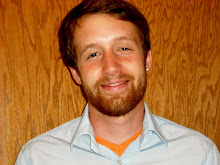Yesterday we spent another Sunday at one of these villages with Luka and Moreto. We were once again honored as special guests, given much food and even an extensive tour this time. Moreto's uncle, Elias, is an evangelist in this village and was so happy to show us around. I got to know him pretty well yesterday as I practiced a lot of Swahili with him. It was the first time that we had time to enter the huts and see women working on jewelry. We played with spears and really got to know people. The four of us ended the tour by sitting in a shaded area with a bunch of the village men. This opportunity has not been bestowed upon us before as they are often off with the animals. We talked extensively about Obama and life in the States. They spent a good amount of time asking Moreto for Sara's hand in marriage and were so happy to receive Obama stickers for their bikes. Following this, we headed in for worship during which there were 16 baptisms. It had been a while since a Pastor had been there and there were many who needed the sacrament. The quiet joy that goes with this many people entering into the family and experiencing the cleansing waters is indescribable. There is a firm desire for something more than this life can offer in this village. Yet, even with all of this fun and joy, this trip was clearly different. There was a certain tinge of desperation in this village.
The area is very very dry currently, and the situation is not improving. The animals have little to eat so the people must travel very far everyday to care for the sacred creatures. During the worship service, which was a short 2.5 hours, we noticed first that many people were present and second that many of the women and children were exceedingly thin. So many people were there because the village has undergone some hard times and they are desperate for some nurturing which many find in the Church. The answer to the second observation was very heartbreaking. There was this man with many wives who took care of many women and children, both his own and those of relatives who died. He was a wealthy man and took very care of his people. Then he contracted cancer and passed away. Since he was the benefactor for so many people, they were left with nothing. This society is explicitly patriarchal. As much as I love the Masai, this is rather troubling. The negativity of this style of life has manifested itself intensely here. Women are not to own anything in this culture. As that is so, they are completely reliant on the patriarch. Since this village's primary patriarch passed, extreme poverty has taken over. None of his people owned anything so once he died they were left with nothing. This is one of the major differences that I have noticed between our culture and the culture here. The recognition of reliance on the earth, animals and people is far more visible here. The last example is negative, but I find that it is normally a very positive community building relationship. Where there is no water or when the Earth is unhealthy, there is no life. Where there is no people, there is no life. Where the animals are suffering, there is no life. This is equally true in the US, but we shroud it in the myth of independence. We all need each other so much. Even though I have always spoken about how I want to be interdependent, I am still a product of my age and place. As a soon graduating college student, I am urged to follow this American dream of independence. It is time to leave the nest. I get this image of a bunch of graduating senior tossing off their caps and picking up cowboy hats to find their way as mavericks in the wild west. Alone, and tough. Being here has made me see that I may talk a lot about community but I have done little to actually push off the myth of independence and live in the truth of interdependence. It is painfully clear now that I truly need other people. I am challenged to go back with a renewed understanding of the centrality of community.

No comments:
Post a Comment